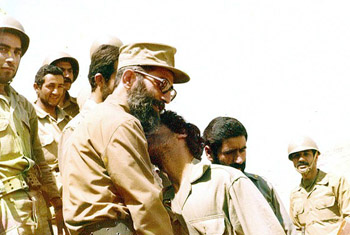Supreme Leader's Sacred Defense Memories

The official website of the Supreme Leader of the Islamic Revolution Ayatollah Ali Khamenei, www.khamanei.ir, has recently released seven memories by the Leader on the occasion of the anniversary of the Sacred Defense.
1. A woman who offered all her
belongings to the Iranian forces at war
During my two or three-day stay in Hamadan, they gave me this letter in which a
woman had written about her sacrifices to the war. She said she had already
sent he husband and sons to the war front and felt embarrassed not to be able
to go over to the battle herself. She also said she had two rings and a little
sum of money which were here savings for several months and that she would
readily offer them to the fighting forces instead of buying her children warm
clothes for the winter.
2. MirzaJavad Tehrani's
Allah-o-Akbar calls beside a mortar carrier
An elderly cleric can sometimes be of much more use than a young one. One of
the esteemed clerics of Mashhad is Haj MirzaJavad Tehrani who went to the front
several times despite his old age.
Once we went to see Imam (Khomeini). During the meeting, Tehrani said he was
viewed by his comrades as an old fellow but had told them he could be useful
sometimes. They had then taken him as a mortar operator who was most motivating
for young forces when they saw him participate so actively in operations.
3. Recon Mission with Martyr Chamran
We were in a recon mission in a region called the "Dob Hordan" in
western Ahwaz. Accompanying us was martyr Chamran. We were a number of comrades
moving across Sousangerd road. We had mortars and were armed pretty well. We
reached a point where a number of the fellows went for reconnoitering the
enemy's facilities. They returned after a short while to say there war in front
of us an invasion fleet of soldier carriers awaiting us. Then martyr Chamran
sent a number of guys for more recon and RPG operators for handling an assault.
Then, we saw mortars stationed all around us. We stayed under a tree for its
shade. Unluckily, the tree turned out to be a proper target for the enemy. It
was God's will that we survived. We were not good enough to martyr or, maybe,
were good enough to stay alive.
4. Deus Ex Machina: How a cannon
withstood two brigades
It is a well-known fact that Allah would intervene in the battlefield to help
the Prophet's side by making his forces look much more formidable than they
seemingly were. Motivation is a crucial factor in the theatre of war. An
unmotivated soldier cannot fight well. I have experienced this by myself.
Once we were left before two and a half Iraqi brigades in Ahwaz. We were only
armed with a cannon which could hardly face a battalion. The Iraqis, on the
other hand, were afraid to face us. They came no further than 20km off Ahwaz.
What were they afraid of? We were enlarged in their eyes. We had formed
guerillas to attack them from time to time and forced them to retreat. We had
become emboldened and were inspired to easily attack them whenever we deemed
proper.
5. "Tell Imam I would sacrifice
my son for him"
No one has heard the families of martyrs and captives be disgraceful of their
fate and that of their sons. Once I was in Mazandaran where a lady insisted on
seeing me. I told my companions to let her come closer and tell us what she had
to say. "I had a son captured by Iraqis and have recently learned that he
was killed during torture. Please, do me a favor and tell Imam I would
sacrifice my other son for him so he won't feel any sad."
I was told similar stories during the course of my trip to Mazandaran and Sari.
When I told Imam about the women and their sacrifices, Imam, with all his
patience and tolerance, broke into tears.
6. Days of grief in Khoramshahr and
Abadan
A few weeks after the seizure of Khoramshahr and siege of Abadan by Iraqi
forces, Abadan island was completely under fire. I felt like someone pressed my
heart when I saw the map of the cities that were now in the hands of the enemy.
My office was a hub for almost all kinds of military initiatives. We had a map
of Abadan in the office which pressured my soul whenever I looked at it. Some
of our fellow comrades had come to believe that Khoramshahr was gone forever
and were planning negotiations with the intruding enemy.
7. I read the wills as Imam had
advised me so
I was inclined to reach wills of martyrs as Imam had advised me to. I have read
almost all of the wills I have had access to. So strange they really are. We
must learn from these wills. They show us how teachings and learning are
dependent on divine blessings. There were wills written by almost illiterate
youths whose sentences abounded with lessons for people like me and us.
Translated by: Abbas Hajihashemi




